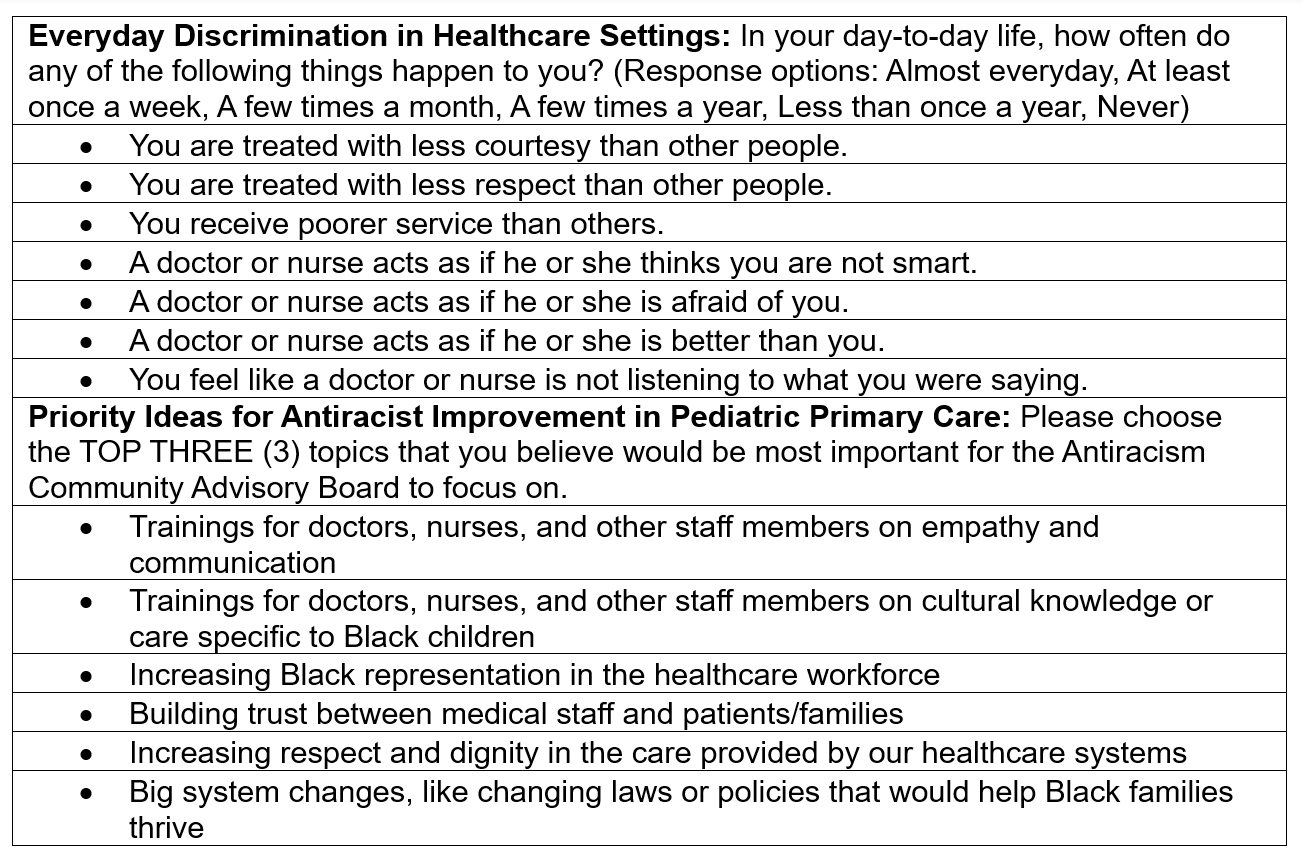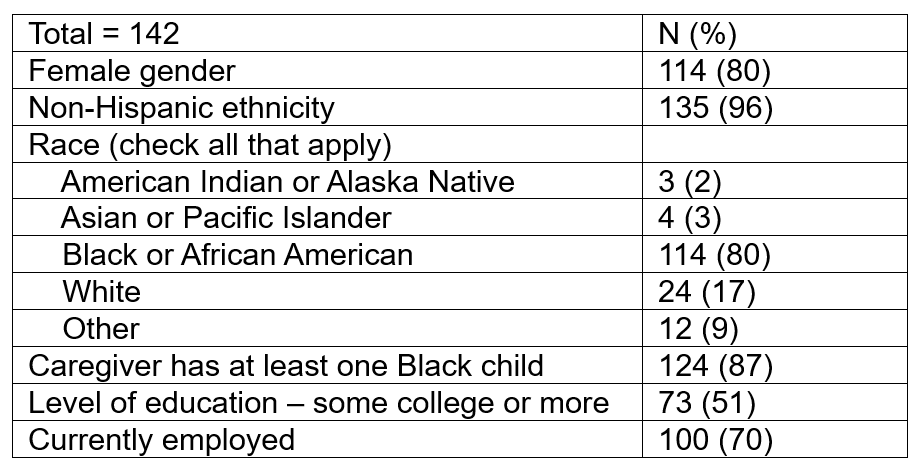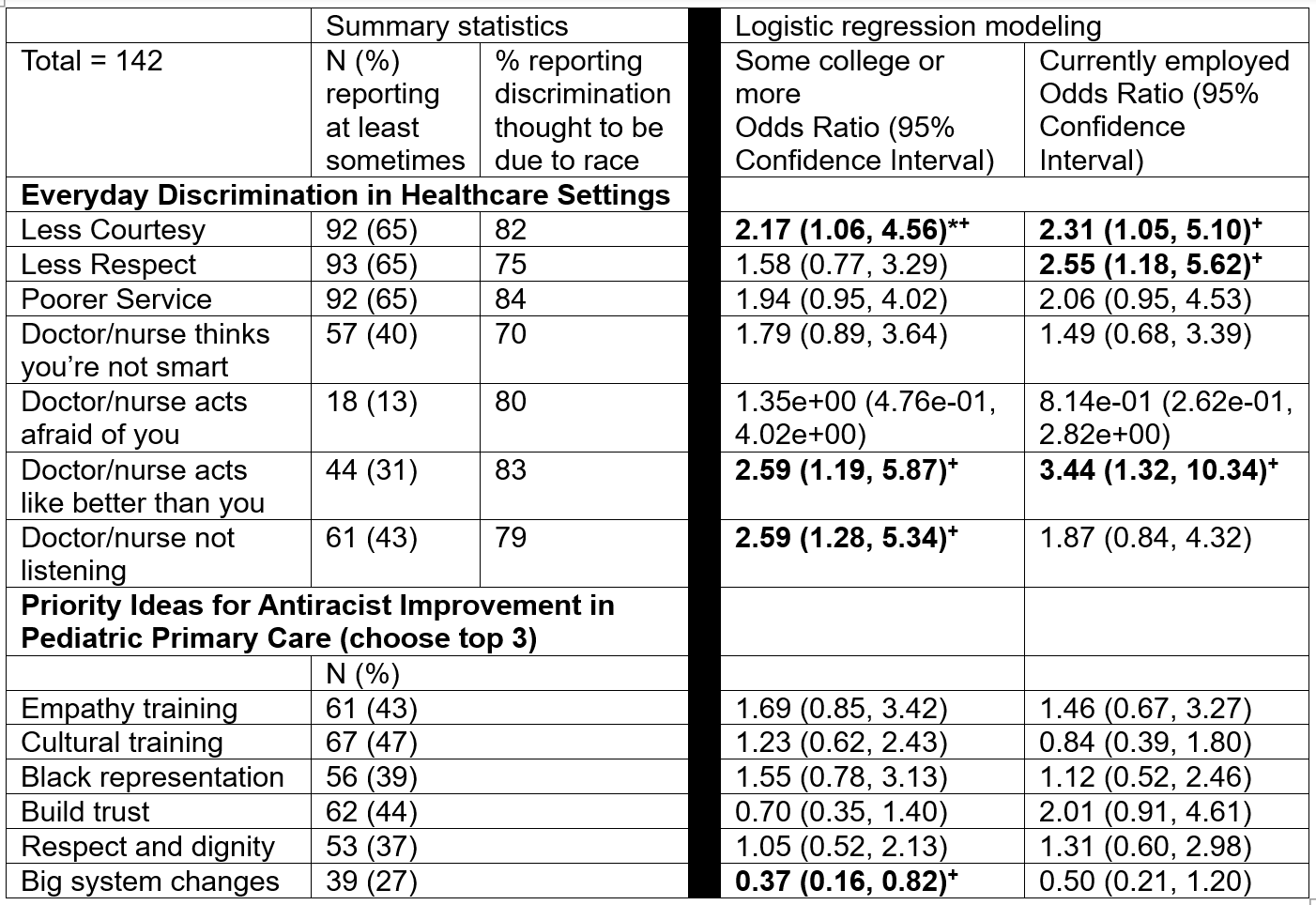Back
Background: The impact of racism on child health outcomes is pervasive. In prior work, we demonstrated racial inequities in pediatric patient family experience; Black families reported worse healthcare experiences than non-Black families. Patient experience is measured frequently, yet direct family experiences of racism in healthcare settings are rarely measured.
Objective: To assess caregiver perspectives on: 1) experiences of racism in healthcare settings, and 2) prioritized focus areas for a pediatric primary care antiracism family research team.
Design/Methods: This was a cross-sectional survey study. A representative sample of caregivers of patients seen at one Cincinnati Children’s primary care center completed a short survey during an office visit. Questions (Table 1) covered demographics, experiences of racism in healthcare settings (using an existing, validated discrimination in healthcare scale), and novel questions to assess participants’ top three priority focus areas for an antiracism family research team (with focus area options informed by our prior qualitative study on experiences of racism in pediatrics). The novel questions were co-written with family partners, pilot tested with 7 participants, and adapted based on cognitive interviews. Final survey results were analyzed using descriptive, bivariate, and multivariable modeling approaches.
Results: Most of the 142 participants identified as female (80%), non-Hispanic (96%), and Black (80%, Table 2). A majority (65%) reported experiencing everyday discrimination (e.g., less courtesy, less respect, poorer service). Discrimination in healthcare settings was reported by 43% of participants. In multivariable modeling, there were higher odds of reporting discrimination by those with at least some college education, and for those who were employed. Participants called for co-produced, antiracist, institutional-level action. The top priority ideas for antiracist improvements within the primary care setting included trainings for healthcare staff and building trust between staff and families (Table 3).
Conclusion(s): At one academic pediatric primary care center, Black caregivers reported frequently experiencing racial discrimination both in everyday situations and in healthcare settings. There were differences in reported discrimination by education level and employment status, reflecting the impact of intersectional identities on the experience of racism. Future work includes continued partnership with Black family co-researchers co-producing, implementing, and testing prioritized improvement interventions.
Table 1. Survey Questions

Table 2. Participant Demographics

Table 3. Survey Responses and Logistic Regression Results
 *Sample interpretation: Participants with some college or more education had 2.17 times the odds of reporting being treated with less courtesy than other people at least sometimes, compared to participants with less than some college education.
*Sample interpretation: Participants with some college or more education had 2.17 times the odds of reporting being treated with less courtesy than other people at least sometimes, compared to participants with less than some college education.
+Significant findings
Health Equity/Social Determinants of Health 9
Session: Health Equity/Social Determinants of Health 9
191 - Racial discrimination in healthcare settings: A survey study of caregivers from one academic pediatric primary care center
Monday, April 28, 2025
7:00am – 9:15am HST
Margaret N. Jones, Cincinnati Children's Hospital Medical Center, Cincinnati, OH, United States; Tierra M. Dennis, CCHMC, Cincinnati, OH, United States; Dominick DeBlasio, Cincinnati Children's Hospital Medical Center, Cincinnati, OH, United States; Mary C. Burkhardt, Cincinnati Children's Hospital Medical Center, Cincinnati, OH, United States; Alexandra Corley, Children's National Health System, Washington, DC, United States; Lori E. Crosby, CCHMC, Cincinnati, OH, United States; Andrew F. Beck, Cincinnati Children's Hospital Medical Center, Cincinnati, OH, United States

Margaret N. Jones, MD, MS, FAAP (she/her/hers)
Assistant Professor
Cincinnati Children's Hospital Medical Center
Cincinnati, Ohio, United States
Presenting Author(s)
Background: The impact of racism on child health outcomes is pervasive. In prior work, we demonstrated racial inequities in pediatric patient family experience; Black families reported worse healthcare experiences than non-Black families. Patient experience is measured frequently, yet direct family experiences of racism in healthcare settings are rarely measured.
Objective: To assess caregiver perspectives on: 1) experiences of racism in healthcare settings, and 2) prioritized focus areas for a pediatric primary care antiracism family research team.
Design/Methods: This was a cross-sectional survey study. A representative sample of caregivers of patients seen at one Cincinnati Children’s primary care center completed a short survey during an office visit. Questions (Table 1) covered demographics, experiences of racism in healthcare settings (using an existing, validated discrimination in healthcare scale), and novel questions to assess participants’ top three priority focus areas for an antiracism family research team (with focus area options informed by our prior qualitative study on experiences of racism in pediatrics). The novel questions were co-written with family partners, pilot tested with 7 participants, and adapted based on cognitive interviews. Final survey results were analyzed using descriptive, bivariate, and multivariable modeling approaches.
Results: Most of the 142 participants identified as female (80%), non-Hispanic (96%), and Black (80%, Table 2). A majority (65%) reported experiencing everyday discrimination (e.g., less courtesy, less respect, poorer service). Discrimination in healthcare settings was reported by 43% of participants. In multivariable modeling, there were higher odds of reporting discrimination by those with at least some college education, and for those who were employed. Participants called for co-produced, antiracist, institutional-level action. The top priority ideas for antiracist improvements within the primary care setting included trainings for healthcare staff and building trust between staff and families (Table 3).
Conclusion(s): At one academic pediatric primary care center, Black caregivers reported frequently experiencing racial discrimination both in everyday situations and in healthcare settings. There were differences in reported discrimination by education level and employment status, reflecting the impact of intersectional identities on the experience of racism. Future work includes continued partnership with Black family co-researchers co-producing, implementing, and testing prioritized improvement interventions.
Table 1. Survey Questions

Table 2. Participant Demographics

Table 3. Survey Responses and Logistic Regression Results
 *Sample interpretation: Participants with some college or more education had 2.17 times the odds of reporting being treated with less courtesy than other people at least sometimes, compared to participants with less than some college education.
*Sample interpretation: Participants with some college or more education had 2.17 times the odds of reporting being treated with less courtesy than other people at least sometimes, compared to participants with less than some college education.+Significant findings

